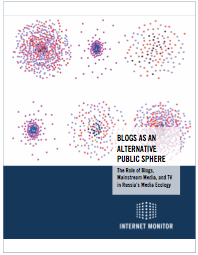
Blogs as an Alternative Public Sphere
The Role of Blogs, Mainstream Media, and TV in Russia’s Media Ecology
"Blogs as an Alternative Public Sphere: The Role of Blogs, Mainstream Media, and TV in Russia’s Media Ecology," authored by Bruce Etling, Hal Roberts, and Robert Faris, is the third paper in the Internet Monitor special report series, which focuses on key events and new developments in Internet controls and online activity. The paper uses data collected from thousands of blogs, mainstream media, and TV sources to examine the role of Russian blogs within Russia's media ecosystem.
Applying a combination of quantitative and qualitative methods, we investigate whether Russian blogs represent an alternative public sphere distinct from web-based Russian government information sources and the mainstream media. Based on data collected over a one-year period (December 2010 through December 2011) from thousands of Russian political blogs and other media sources, we compare the cosine similarity of the text from blogs, mainstream media, major TV channels, and official government websites. We find that, when discussing a selected set of major political and news topics popular during the year, blogs are consistently the least similar to government sources compared to TV and the mainstream media. We also find that the text of mainstream media outlets in Russia (primarily traditional and web-native newspapers) are more similar to government sources than one would expect given the greater editorial and financial independence of those media outlets, at least compared to largely state-controlled national TV stations. We conclude that blogs provide an alternative public sphere: a space for civic discussion and organization that differs significantly from that provided by the mainstream media, TV, and government.
About Internet Monitor
Internet Monitor is a research project to evaluate, describe, and summarize the means, mechanisms, and extent of Internet content controls and Internet activity around the world. The project will compile and curate data from multiple sources, including primary data collected by the Berkman Center and our partners, as well as relevant secondary data. Internet Monitor will create a freely available online fact base that will give policy makers, digital activists, and user communities an authoritative, independent, and multi-faceted set of quantitative data on the state of the global Internet. The project will also produce annual reports that compile this information and provide expert analysis on the state of the global Internet.
The Internet Monitor is a project of the Berkman Center for Internet & Society. It is funded by the US Department of State and the MacArthur Foundation. For more information about the project, please see the Internet Monitor website.


